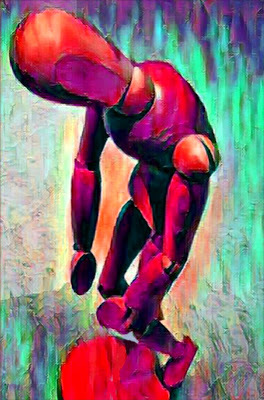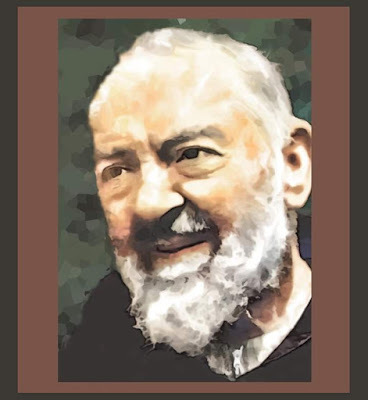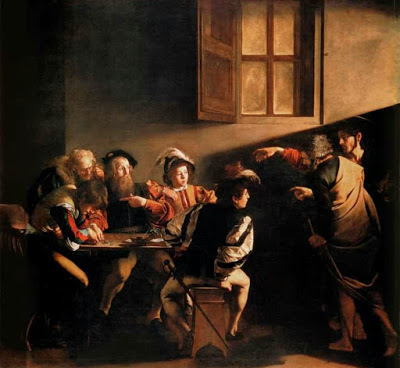John Janaro's Blog, page 114
September 30, 2020
Saint Jerome "Finds the Words of God"

"So you want 'realism'?" Caravaggio asked. "My kind of realism? OK, but I'm gonna at least give him a table. I mean, people can only take so much...."
Here is CARAVAGGIO'S "SAINT JEROME" (1605).
"Your words were found and I consumed them;
Your word became the joy and the happiness of my heart" (Jeremiah 15:16).
Happy Feast of Saint Jerome!
Published on September 30, 2020 20:51
September 28, 2020
Baseball Braketology Begins
 Oh you crazy 2020. Staaahp!
Oh you crazy 2020. Staaahp!I have seen many wild, weird, wacky things in my 57+ years of life, but I never dreamed I would live to see anything like... this, THIS... nutty baseball "season."
Now the "Irregular Season" is over after 60 games. On the one hand, we did get to have baseball. It was worth it.
Baseball on TV only. With no fans (but artificial "fan-track" - which was actually better than nothing). Baseball with seven inning doubleheaders, universal DH, extra innings starting with a runner on second base. (!) And now, sixteen teams in the "postseason," an entire first round of seeded matchups, eight three game serieses to determine who advances to the "next round."
Baseball "Braketology"?
Alas, our beloved World Champion Washington Nationals didn't even make the "Round of 16." The Nats were just getting warmed up when the season ended.
There are some happy things. The Nats finished strong, rallying to a final record of 26-34 and tying the Mets for fourth place. It was a dignified ending. Juan Soto hit .351 to win the National League batting title a few weeks before his 22nd birthday. Some young players brought some excitement to... well, our house at least, and no doubt many others.
I'm proud of our Nationals. I hope we can have a "regular" regular season next year, but we know not what awaits us in baseball or any of the other events we had grown accustomed to in the pre-Covid19 world.
I hope that baseball has not passed the point of no return. When (if?) we return to the old ways, someday, I hope we won't keep any of these crazy new rules. Sixteen playoff teams??
I know, it’s just “special” for pandemic, they say! That’s like what the mythological Pandora said before she opened the box ... “I just want to take ONE little peek, just once.”
Forces have been unleashed! Is the proverbial “cat out of the bag”? I hope not.

Published on September 28, 2020 20:24
September 27, 2020
Avril Lavigne is How Old???
 In her kitchen, like... last week! Seriously?Happy Birthday, Avril Lavigne!
In her kitchen, like... last week! Seriously?Happy Birthday, Avril Lavigne!The Sk8er Grrl is 36 years old, and everyone finds it hard to believe. "She hasn't aged a DAY since 'Complicated' came out in 2002!", people cry out with a mixture of amazement, admiration, and... I don't know, maybe envy?
They are exaggerating.
First of all, 36 is not that old. 36 is still young! Secondly, she has "grown" artistically and survived some very difficult experiences (the insanity of superstardom and the paralysis of serious illness). I'm struck by the fact that she's "still in one piece," she's sober (and pretty much always has been, in spite of her rebellious role-playing), she's relatively normal (as rock stars go). Aging? C'mon, she has “people” to make her look good, plus she is just one of those small-sized folks who is just always going to "look young."
Avril's "ageless look" may be a crisis for the younger generation. People my age don't think much of it. We are much more likely to envy her Beverly Hills mansion, her swimming pool, and her 55-million-dollar net worth. (Greed lives longer than all the other vicious temptations.) I'm actually impressed that she has not squandered her money, and that she invests her time advocating for people with chronic illnesses. I'm grateful for her dedication to fighting Lyme Disease.
But I get how folks born in the '80's might be freaking out. Calm down, peeps. I know. This is not really about Avril. It’s about a more fundamental experience you’re going through that has you a bit... unsettled. The bottom line is this: if Avril Lavigne is in her mid-30s, then so are you. Yikes!
Published on September 27, 2020 18:51
September 26, 2020
Suicide Prevention and Awareness about Mental Health
 September is National Suicide Prevention and Awareness Month.
September is National Suicide Prevention and Awareness Month.And, inevitably, it's not until the end of September that I can bring myself to write anything about it. I know how horribly real, devastating, and incomprehensible it is when a family member or friend dies by suicide.
I think that when this happens, it is rarely the result of a fully rational and free choice by the person to kill his or her self. Generally, these tragedies involve people with severe psychiatric afflictions that may or may not be evident to those around them. The behavior that results in their death is set in motion by a pathologically distorted perception of themselves and/or their environment.
What I might be able to contribute along the lines of "awareness" is to emphasize some important factors regarding mental health.
Please note: I am not a medical doctor nor do I have any training in the mental health or counseling professions. I am an experienced patient, as well as a university professor in humanities, an active scholar and author, and an incurable thinker who has had a lot of time (and a lot of personal motivation) to think about these things.
The psychological dimension of our humanity remains mysterious in many ways, but we continue to learn about what helps and what harms its delicate balance, how it shapes our attitudes and actions, and how psychological disorders can hinder and even cripple a human being. Psychological health is affected by our own actions, but it is to a significant degree woven from predispositions, events, and experiences that impact us in ways outside our control. Obviously, there are ways to respond to and reintegrate the damage inflicted by bad experiences on our psychological "inner fabric" (and important ways to be helped in doing this). But often we can't "fix" all the complex features of inner brokenness, and therefore we must endure the pain that remains. Psychological suffering is real, and none of us can presume to measure how great is the burden borne by another person.
There is another important and particular point that continually needs to be emphasized: what we categorize as psychological or mental problems are often connected to empirically accessible "physical" diseases, imbalances, and afflictions. Overall physical health and the hormonal and central nervous systems have a significant impact on how well we "think and feel." Then there is the health of the brain itself. In my lifetime, much has been discovered about the complexity of brain functioning and the wide variety of ways it can be damaged or diseased. Neurobiological research still holds much potential, but medications have already been developed that help treat brain disorders in a more "fine-tuned" manner. There are no miracle drugs, but psychiatric medications - responsibly used under proper supervision - can contribute to a therapeutic regimen that makes a big difference in people's lives.
I can vouch for this. Psychiatric medications have been a great help to me in my own 47-year-long battle with depression and OCD. (Ten years ago, I published a book about my experiences which is still available HERE.) I'm old enough to remember what it used to be like struggling with mental illness. Things have gotten a lot better, and the stigma surrounding it has generally decreased.
At the same time, it is often said that we have more mental illness in today's technologically advanced societies than ever before. In part, this might be explained by the fact that we have more awareness and more openness about mental health. But it may also be true that the stressful environments we live in today may be harder on brain health, especially for people who have a (possibly hereditary) predisposition to develop neurochemical imbalances.
There are many reasons why life today has a higher tension, requires more mental energy, and passes through more phases of stress and abrupt change than in the past. I have written about this elsewhere on the blog, with regard to issues related to the enormous growth of technological power. I think it's important to be aware that depression (which is often a factor in the tragedy of suicide) can be a condition "managed" over a lifetime, and subject to different phases of intensity. And while most people learn to navigate the hard stresses of modern life, there are some (perhaps more now than in the past) for whom modern tensions are experienced as overwhelming and "tramatic" events, and who face more personal disruption as a result.
People who are already "managing" (formally or informally) with depression or some related disorder based on a neurobiological-dysfunction/chemical-imbalance in the brain are subject to experiencing a "flare-up" (i.e. their disorder may become symptomatically acute) because of a triggering event - and in our society these may involve disruptions in physical or emotional life, employment, or any number of intense transitions or problems similar to what many people experience in one way or another as stressful and difficult, but manage to recover from and move on. Whereas for people with depression these circumstances and events can have a traumatic effect. They can crack the very fragile edifice of coping mechanisms, the network of convictions, and perhaps even the neurological "rerouting" that the brain has developed to compensate for its chemical or functional weakness. The result is that the whole edifice is destroyed, and the person loses their handle on their "normal" perception and judgment of life, interests, relationships, etc. Recovery will depend on the person's success in reconstructing another "cognitive edifice" with the help of a positive environment and support, psychotherapy, short-term or long-term assistance from medication, and other kinds of therapeutic care. The healing that is achieved will always be tenuous and susceptible to re-injury.
 There are many ways you can help someone suffering from depression, but it does not help to tell them to make themselves better by their own willpower or some kind of self-initiated activity. The depressed person cannot "get over it" or "pull themselves up by their own bootstraps." This helplessness is one of the distinguishing characteristics of depression.
There are many ways you can help someone suffering from depression, but it does not help to tell them to make themselves better by their own willpower or some kind of self-initiated activity. The depressed person cannot "get over it" or "pull themselves up by their own bootstraps." This helplessness is one of the distinguishing characteristics of depression.Nevertheless, depressed people often don't recognize their own helplessness, which means that they are already adding frustration and self-blame to the depression itself. What you may be able to do is to help them realize their need for specifically psychiatric help, or at least to encourage them and help them to accept that there is no shame in seeking care for mental health. Be gentle, be supportive, be available, and - depending on your relationship with the person - try to help them be accountable for keeping up their healing work, keeping concrete goal in focus, communicating with doctors and therapists, taking their medication, and assessing progress. Be a human being, and treat them as human beings, with all the dignity and love they deserve. Don't dismiss the human person with prepackaged demands or ideas for what they must do to "fix themselves" so that they might become "worthy" of being loved and respected as human beings. This is actually more difficult than you might think. We tend to disrespect one another all the time, even in "normal" situations. You will not always succeed, but be humble and keep trying. Be a friend. Become better informed about mental health, and get advice from professional on the role you play in the person's life. Be a part of their "team" along with caregivers and other friends and family. Know the role you play and work together with them.
It is very important for other people not to add fuel to the fire of emotional abuse that a depressed person is already afflicting themselves with. That person has already run through the list of "healthy lifestyle choices" they've failed to make, "positive attitudes" they haven't cultivated, prayers they've failed to say, and many other reasons why they think that they ought to blame themselves for their various incapacities. This spiral of self blame and deeper incapacitation can become a whirlwind of interior violence that spins entirely out of the bounds of rationality. A level of delusion emerges which can lead to external self-inflicted violence.
We can imagine how something like suicide may be waiting at the bottom of this descending spiral, like a black hole. But this hardly even begins to grasp even one facet of the destructive catastrophe that is suicide. I know something of the incapacitating strangeness of depression, the suffering it causes, the disconnection from one's sense of one's own value such that one longs to shrink into a little ball and disappear. None of these afflicted states are necessarily aiming at suicide. That doesn't mean we shouldn't care about people who are suffering in this way. It's terrible suffering. We need to help people who are suffering in these ways.
Of course, even in these general and limited considerations, I cannot forget that I am a Christian. Faith, prayer, the sacraments, and spiritual guidance matter very much here. They can reach aspects of suffering (physical or mental) that are inaccessible by other efforts. Jesus brings light to every kind of darkness. Jesus wants our healing. But he wants us to follow him, to do the will of the Father. The things of faith are not meant to replace our humanity. Faith is not a cheap substitute for the human care we owe to one another, or for the application of what medical science and the arts of the healing professions can provide. "Miracles" are possible, but they certainly won't happen for us if we neglect our responsibilities to receive God's help through the natural and human gifts he has already placed on our path. We can rely confidently on God's grace to give us the courage to follow him by seeking all the appropriate resources for help, and by enduring the sufferings that cannot be helped because they exceed the possibilities for human healing available to us and because God permits them (for a time) because he has encompassed them within his plan, through Jesus Christ, to unite us more fully to himself.
It is our task to bring comfort to the afflicted and mercy to those in need. We can't judge with condemnation the ultimate destiny of anyone who dies by their own hand. On the contrary we have reasons to hope in God's mercy, including the perspective that an awareness of mental illness gives us, that suggests full culpability is so often lacking in these tragedies. Why God permits this kind of awful thing is a question that remains mysterious and painful for the living. Still, we must continue to trust in him. Before suicide happens, however, we must do everything we can to help the afflicted person step away from the edge. We must accompany them, love them, and beg them to stay with us. Life is always a gift. As long as it is given, we don't have the right to choose to give up on it, or to neglect other lives entrusted to our care.
I don't have "internal experience" of what leads to a suicide attempt. I have been at the bottom of some of depression's awful holes, but I'm not suicidal. Not everyone with serious depression thinks about or makes a plan or tries to do something to end their own life. There are differences between "feeling like you want to die," "feeling like you are somehow 'dead'," "feeling like you have no value" and "feeling like you should take steps to end your own life." They are all destructive and dangerous states of disordered perception that require personal attention, and medical and therapeutic care.
I know something of what it feels like to "want to die," such that I have had to work on "wanting to live." I still work on it, although in these days - as difficult as they are - I very much want to live. I have never "felt like ending my own life," which is not anything I can take credit for. It's not one of the sufferings that afflicts me. I have wailed in desperate sorrow for the incomprehensible loss of someone else. Why him and not me? I don't know. There are different kinds of depression and different levels, and different ways that it combines with a wide spectrum of other mental disorders. Prevention experts have useful information for helping us identify signs of specific danger (this LINK is an accessible and wide ranging resource from the National Institute of Mental Health).
We can only do our best. Most of the suicides I know or have heard about are very complicated. They still seem like a bunch of knots that I cannot even begin to untie.
There's an element in suicide that is quite obscure to me, that I can't analyse. It's inexplicable to me how I lost my friend 15 years ago on a bright beautiful Fall day, or how we lost some kids in our area over the past decade. Nothing I think or say will ever be anywhere near enough to explain what happened.
To loved ones who remain behind, it stays like an open wound. It always hurts, but it's a pain that cries out to the infinite mercy of God. It stays open as a space where the seeds of ultimate hope mysteriously grow for those we have lost.
Published on September 26, 2020 20:06
September 24, 2020
"O Lord, You Have Been Our Refuge"

From the readings of the day:
"Vanity of vanities!
All is vanity!
What profit has man from all the labor
which he toils at under the sun?
"All speech is labored;
there is nothing one can say.
The eye is not satisfied with seeing
nor is the ear satisfied with hearing"
(Ecclesiastes 1:2-3, 8).
"In every age, O Lord, you have been our refuge"
(Psalm 90:1).
[Image above: Tattoo, "All is Vanity" from right forearm of Christina Grimmie.]
Published on September 24, 2020 20:33
September 23, 2020
We Are Grateful to Padre Pio
 My blog seems more and more to be pictures and commentary on the Roman liturgical calendar.
My blog seems more and more to be pictures and commentary on the Roman liturgical calendar.One thing I love is how the cycle of seasons, feasts, and memorials of the saints fill the entire year with "beautiful days" - like flashes of transfigured light breaking through into our time, marking our days as we journey toward the unending fullness of that glory.
Every month, every week has special moments to anticipate. There are the seasons and particular observances and celebrations of the life, death, and resurrection of Jesus, the coming of the Holy Spirit, and the maternal companionship of Mary.
Then there are all the days honoring the lives of (and nurturing real ongoing "ecclesial relationships" with) men and women of every time and place, language and culture, who have gone before us and are recognized as "co-workers" with Christ by the Church's liturgical prayer.
The saints are all glorified members of Christ's body, His servants, His instruments, our companions and helpers. They are gifts to us, entirely formed by God's grace and love, witnesses to the glory of Jesus our Savior. At the same time each one of them is unique, with his or her own personality and humanity that reverberates in the Church's memory in many different ways.
The more recent saints may be remembered from the time of their earthly journey by some people who are still living. I myself have met and spoken personally with two saints, John Paul II and Mother Teresa, both of whom had a profound personal impact on my life. This is true for many of my generation. In our time, "giants walked the earth." Every age has them, of course, but there were a few in the late 20th century whose greatness was impossible for anyone to ignore even while they lived in this world. Through then, the Spirit kindled fires in many hearts.
Padre Pio was a little before my time, but people from the previous generation remember him while he was still in this life. I have known some families where the parents knew him personally (one even worked as a doctor in his hospital). Of course they have special stories about him, beautiful and very personal stories...
But like all saints, Padre Pio has become immensely greater since he went home to be with the Lord on September 23, 1968. Still, he was widely known and sought out (especially by Italians) during his years at the Franciscan Friary of San Giovanni Rotondo - this priest who bore the wounds of Christ, the "stigmata" (as well as many other deeper hidden pains and trials), who tirelessly heard confessions and through his special gifts reconciled so many and brought spiritual healing, and who also had a special dedication to serving and accompanying people afflicted with physical illnesses. Among the many aspects of Padre Pio's legacy is the beautiful hospital he built near the friary, which he called "the House for the Relief of Suffering."
He is dear to me in a particular way for his tremendous compassion for the sick. That compassion and companionship is a personal gift that he still offers today. He brings consolation to the afflicted when they call upon him.
My own story has a little place here. I didn't have any special devotion to Padre Pio. But I "feel like" he sought me out and offered his help (saints do this more than we realize, I'm convinced). Around the time of our Teresa's birth (in 2002) and shortly before the beginning of some very difficult times for me, it seems like he made me aware of his humble presence, as if to say, "I'm here for you, I'm helping you." Even though this may have been just a subjective experience or my own human psychological impression (and there's no way to prove it was anything more), still I find that I want to describe this as having something of the nature of an encounter. It was personal.
 Since then I think he has “touched my shoulder” a few times and in some way said to me, “John, I know what you suffer. I had these sufferings too in my life” (I don’t know if he actually had specific illnesses related to mine, but it’s possible - Padre Pio was much afflicted in so many ways during his life).
Since then I think he has “touched my shoulder” a few times and in some way said to me, “John, I know what you suffer. I had these sufferings too in my life” (I don’t know if he actually had specific illnesses related to mine, but it’s possible - Padre Pio was much afflicted in so many ways during his life).I know that I have been consoled and encouraged and helped by him, and I invoke his intercession every day. I am reminded that God understands me, because people often don’t understand, and I don’t understand myself. Even regarding the complexity of my health, no one really knows what's going on. I don't know, and sometimes I feel confused and overwhelmed. Why am I such a mess, such a human wreck? Why do I have such a clunky brain?
But I have been so greatly blessed by the Lord, so much more than anything I have had to endure. And like so many people, I am grateful to Saint "Padre Pio" for more than I know, and I will continue to rely on his friendship in the communion of saints.
Near the end of his many years of fidelity and suffering, he is reported to have said, "tell everyone that, after death, I will be more alive than ever. And to all those who come to ask, it will cost me nothing to give to them."
Published on September 23, 2020 20:45
September 22, 2020
Equinox is Here Again
 Image from dictionary[dot]com, click LINK
Image from dictionary[dot]com, click LINKHappy Autumn Equinox to all my peeps in the Northern Hemisphere.
¡Y feliz Eqinoccio de Primavera a mis amigos Sureños en lugares como Argentina!
Published on September 22, 2020 18:55
September 21, 2020
Matthew and the Gaze of Jesus
 Pope Francis often links the beginning of his own vocation to the priesthood to his experience of the merciful gaze of Jesus, who looked upon him and called him in late adolescence through the eyes of a kind parish priest who was his confessor and guide.
Pope Francis often links the beginning of his own vocation to the priesthood to his experience of the merciful gaze of Jesus, who looked upon him and called him in late adolescence through the eyes of a kind parish priest who was his confessor and guide.Some years ago, the Pope took the occasion of today's feast of Saint Matthew the-tax-collector-turned-apostle to preach about this loving, penetrating way that the Lord regards each one of us.
"Jesus’ gaze always lifts us up. It is a look that always lifts us up, and never leaves us in our place, never lets us down, never humiliates. It invites you to get up; [it is] a look that brings you to grow, to move forward, that encourages you, because it loves you. The gaze makes you feel that He loves you.
"And sinners, tax collectors and sinners, they felt that Jesus had looked on them, and that gaze of Jesus upon them (I believe) was like a breath on embers, and they felt that there was fire in the belly, again, and that Jesus had lifted them up, gave them back their dignity. The gaze of Jesus always makes us worthy, gives us dignity. It is a generous look.
"'But behold, what a teacher: dining with the dregs of the city!'
"But beneath that dirt there were the embers of desire for God, the embers of God's image that wanted someone who could help them be kindled anew. This is what the gaze of Jesus does.
"All of us find ourselves before that gaze, that marvelous gaze, and we go forward in life, in the certainty that He looks upon us. He too, however, awaits us, in order to look on us definitively, and that final gaze of Jesus upon our lives will be forever, it will be eternal.
"I ask all the saints upon whom Jesus has looked, to prepare us to let ourselves be looked upon in life, and that they prepare us also for that final – and first! – gaze of Jesus!"
~Pope Francis
Published on September 21, 2020 19:17
September 20, 2020
They Keep Blooming...

If these roses insist on blooming seven months out of the year, I'm going to keep taking pictures of them!
Published on September 20, 2020 01:50
September 19, 2020
"Saint Janaro's Day?" I Say "YES"!
 Happy "Janaro Family Feast Day"! Buona Festa di San Gennaro!
Happy "Janaro Family Feast Day"! Buona Festa di San Gennaro!Today is the Feast Day of the Great Ancestor of the Janaro Clan, the original Saint Januarius, fourth century bishop and martyr in what is today south-central Italy.
That our paese, at least for the Janaro part of the family. My great-grandfather came over from there to New York in the late 19th century.
He arrived a bit prior to the stampede of Italian immigrants who poured into the USA, Argentina, and Uruguay around the the turn of the 20th century. His name was Pasquale Janaro, and an Italian friend once told me that such a name could only come from within a stretch of 50 kilometers around the greater Neapolitan area. So I'm sure Saint Januarius must, somehow, be related to us, what with the "Benevento" and "Naples" regional traditions and all (umm, I'm gonna resist the temptation to say something cheesy like "his BLOOD moves through our veins," no, no jokes like that
Published on September 19, 2020 18:35



